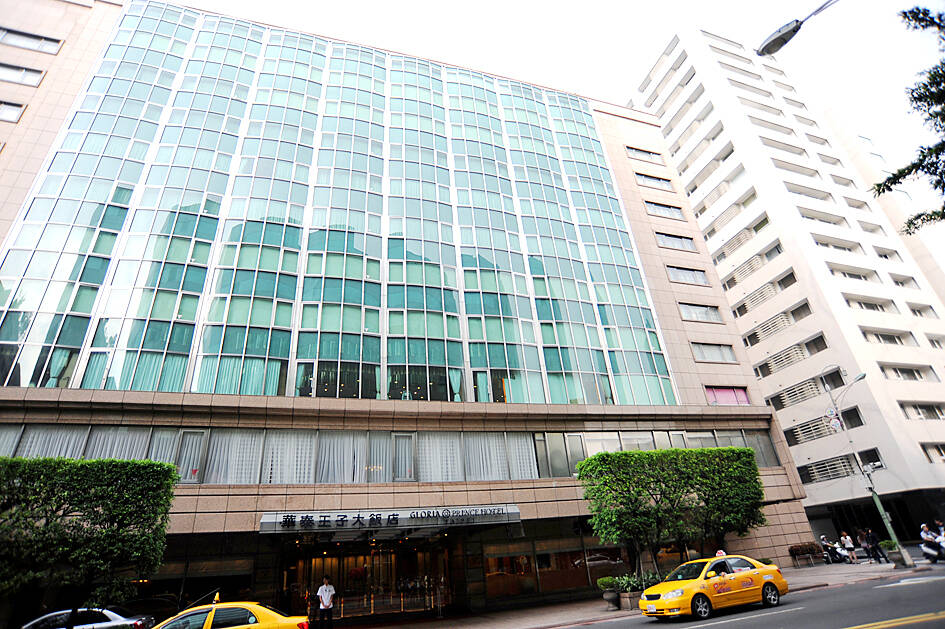Gloria Hotel Group (華泰大飯店集團) is to shut down its 50-year-old Gloria Prince Hotel (華泰王子大飯店) in Taipei’s Zhongshan District (中山) next month to pave the way for an urban renewal project and cut losses amid the COVID-19 pandemic.
The hotel on Linsen N Road said on its Web site that it would cease operations on Oct. 11, in line with the group’s plan to maximize the property’s value.
The announcement came after several local peers, including Leofoo Hotel (六福客棧), Ambassador Hotel Taipei (台北國賓飯店), the Sherwood Taipei (西華飯店), San Want Hotel (神旺大飯店) and Imperial Hotel Taipei (台北華國大飯店), made similar moves.

Photo: Peter Lo, Taipei Times
Tourist hotels have been affected most heavily by border controls and quarantine requirements that have kept foreign tourists away for most of the past three years. Occupancy rates at popular properties put up decent showings on weekends and holidays, but remained soft on weekdays.
Gloria Prince, allied with Japan’s Seibu Group, has focused on serving group and individual tourists from the neighboring country. To hedge losses, it relocated its Lidiot (驢子) and Chiou Hwa (九華樓) restaurants to Taipei’s Dazhi (大直) area.
The group also owns hotel brands Gloria Residence (華泰瑞舍), Hotel Quote and Hotel Proverbs in Taipei, resort property Gloria Manor (華泰瑞苑) in Pingtung County’s Kenting (墾丁), and Gloria Outlets (華泰名品城).
The group is reportedly planning to collaborate with UT Land Development Group (忠泰建設) to turn Gloria Prince into a mixed-use complex with 21 floors above ground and 6 basement floors.
The upcoming complex would feature a new hotel with 100 guestrooms and set aside the remaining floors as upscale office spaces that could come into service in 2026 if work on regeneration starts next year.
The two sides seek to extend the urban renewal project to neighboring apartments, pending their owners agreement to participate.
The government has encouraged regeneration projects by granting favorable floor space ratios and sparing them of credit controls as it seeks to enhance building safety and stimulate domestic demand.

SEMICONDUCTOR SERVICES: A company executive said that Taiwanese firms must think about how to participate in global supply chains and lift their competitiveness Taiwan Semiconductor Manufacturing Co (TSMC, 台積電) yesterday said it expects to launch its first multifunctional service center in Pingtung County in the middle of 2027, in a bid to foster a resilient high-tech facility construction ecosystem. TSMC broached the idea of creating a center two or three years ago when it started building new manufacturing capacity in the US and Japan, the company said. The center, dubbed an “ecosystem park,” would assist local manufacturing facility construction partners to upgrade their capabilities and secure more deals from other global chipmakers such as Intel Corp, Micron Technology Inc and Infineon Technologies AG, TSMC said. It

NO BREAKTHROUGH? More substantial ‘deliverables,’ such as tariff reductions, would likely be saved for a meeting between Trump and Xi later this year, a trade expert said China launched two probes targeting the US semiconductor sector on Saturday ahead of talks between the two nations in Spain this week on trade, national security and the ownership of social media platform TikTok. China’s Ministry of Commerce announced an anti-dumping investigation into certain analog integrated circuits (ICs) imported from the US. The investigation is to target some commodity interface ICs and gate driver ICs, which are commonly made by US companies such as Texas Instruments Inc and ON Semiconductor Corp. The ministry also announced an anti-discrimination probe into US measures against China’s chip sector. US measures such as export curbs and tariffs

The US on Friday penalized two Chinese firms that acquired US chipmaking equipment for China’s top chipmaker, Semiconductor Manufacturing International Corp (SMIC, 中芯國際), including them among 32 entities that were added to the US Department of Commerce’s restricted trade list, a US government posting showed. Twenty-three of the 32 are in China. GMC Semiconductor Technology (Wuxi) Co (吉姆西半導體科技) and Jicun Semiconductor Technology (Shanghai) Co (吉存半導體科技) were placed on the list, formally known as the Entity List, for acquiring equipment for SMIC Northern Integrated Circuit Manufacturing (Beijing) Corp (中芯北方積體電路) and Semiconductor Manufacturing International (Beijing) Corp (中芯北京), the US Federal Register posting said. The

India’s ban of online money-based games could drive addicts to unregulated apps and offshore platforms that pose new financial and social risks, fantasy-sports gaming experts say. Indian Prime Minister Narendra Modi’s government banned real-money online games late last month, citing financial losses and addiction, leading to a shutdown of many apps offering paid fantasy cricket, rummy and poker games. “Many will move to offshore platforms, because of the addictive nature — they will find alternate means to get that dopamine hit,” said Viren Hemrajani, a Mumbai-based fantasy cricket analyst. “It [also] leads to fraud and scams, because everything is now